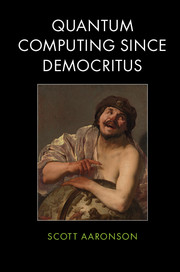Book contents
- Frontmatter
- Dedication
- Contents
- Preface
- Acknowledgments
- 1 Atoms and the void
- 2 Sets
- 3 Gödel, Turing, and friends
- 4 Minds and machines
- 5 Paleocomplexity
- 6 P, NP, and friends
- 7 Randomness
- 8 Crypto
- 9 Quantum
- 10 Quantum computing
- 11 Penrose
- 12 Decoherence and hidden variables
- 13 Proofs
- 14 How big are quantum states?
- 15 Skepticism of quantum computing
- 16 Learning
- 17 Interactive proofs, circuit lower bounds, and more
- 18 Fun with the Anthropic Principle1
- 19 Free will
- 20 Time travel
- 21 Cosmology and complexity
- 22 Ask me anything
- Index
- References
14 - How big are quantum states?
Published online by Cambridge University Press: 05 April 2013
- Frontmatter
- Dedication
- Contents
- Preface
- Acknowledgments
- 1 Atoms and the void
- 2 Sets
- 3 Gödel, Turing, and friends
- 4 Minds and machines
- 5 Paleocomplexity
- 6 P, NP, and friends
- 7 Randomness
- 8 Crypto
- 9 Quantum
- 10 Quantum computing
- 11 Penrose
- 12 Decoherence and hidden variables
- 13 Proofs
- 14 How big are quantum states?
- 15 Skepticism of quantum computing
- 16 Learning
- 17 Interactive proofs, circuit lower bounds, and more
- 18 Fun with the Anthropic Principle1
- 19 Free will
- 20 Time travel
- 21 Cosmology and complexity
- 22 Ask me anything
- Index
- References
Summary
I'm going to talk about the title question, but first, a little digression. In science, there's this traditional hierarchy where you have biology on top, and chemistry underlies it, and then physics underlies chemistry. If the physicists are in a generous mood, they'll say that math underlies physics. Then, computer science is over somewhere with soil engineering or some other nonscience.
Now, my point of view is a bit different: computer science is what mediates between the physical world and the Platonic world. With that in mind, “computer science” is a bit of a misnomer; maybe it should be called “quantitative epistemology.” It's sort of the study of the capacity of finite beings such as us to learn mathematical truths. I hope I’ve been showing you some of that.
How do we reconcile this with the notion that any actual implementation of a computer must be based on physics? Wouldn’t the order of physics and CS be reversed?
Well, by similar logic one could say that any mathematical proof has to be written on paper, and therefore physics should go below math in the hierarchy. Or one could say that math is basically a field that studies whether particular kinds of Turing machine will halt or not, and so CS is the ground that everything else sits on. Math is then just the special case where the Turing machines enumerate topological spaces or do something else that mathematicians care about. But then, the strange thing is that physics, especially in the form of quantum probability, has lately been seeping down the intellectual hierarchy, contaminating the “lower” levels of math and CS. This is how I’ve always thought about quantum computing: as a case of physics not staying where it’s supposed to in the intellectual hierarchy! If you like, I’m professionally interested in physics precisely to the extent that it seeps down into the “lower” levels, which are supposed to be the least arbitrary ones, and forces me to rethink what I thought I understood about those levels.
- Type
- Chapter
- Information
- Quantum Computing since Democritus , pp. 200 - 216Publisher: Cambridge University PressPrint publication year: 2013



